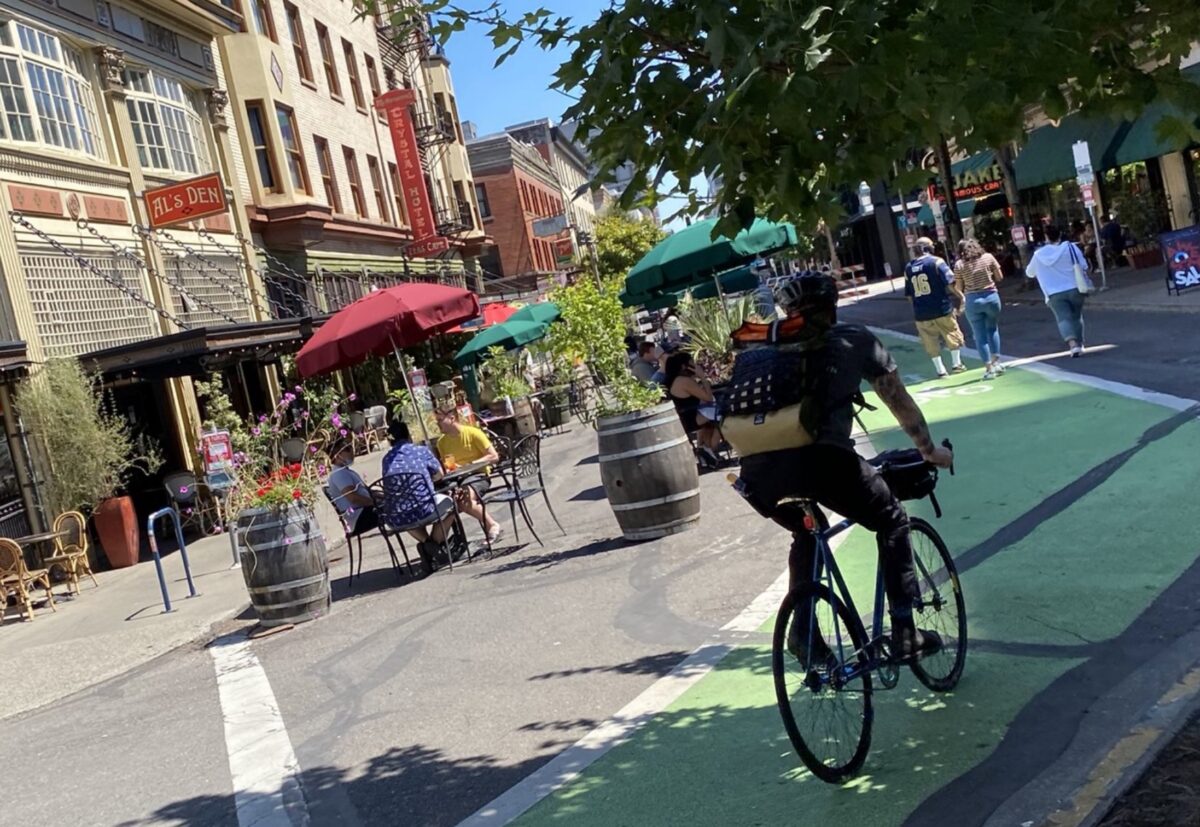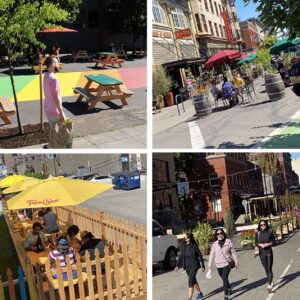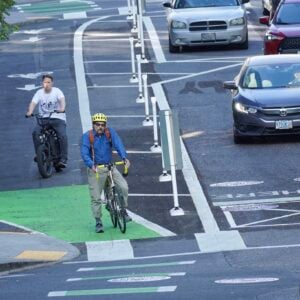
The honeymoon for free use of Portland’s public right-of-way will soon be over. The bureau of transportation just announced a new fee structure for their Healthy Business permits that have been awarded to over 1,000 businesses since May 2020.
Starting September 1st, businesses will have to pay $150 for an application, then pay $500 for every parking space and $6 for each linear foot of sidewalk space they use.
These permits have been extremely popular with restaurants who were eager to expand onto streets and sidewalks in order to keep patrons healthy during the pandemic. Back in March PBOT announced the program would become permanent. Up until now, businesses have been using public space at no charge. PBOT has offset the expenses with federal pandemic relief funding and their own generosity borne out of a goal to help keep businesses alive during a difficult time.
In a statement today, PBOT said the new fees will cover administration costs and allow them to support and evaluate permit holders. Current Healthy Business permits are valid through August 31st of this year. The new fees go into effect September 1st and permits issued under the new system will be valid through December 2023.







Thanks for reading.
BikePortland has served this community with independent community journalism since 2005. We rely on subscriptions from readers like you to survive. Your financial support is vital in keeping this valuable resource alive and well.
Please subscribe today to strengthen and expand our work.
If they are gonna charge businesses $500 per parking spot, probably all curbside parking should at least cost $500 per year (or per whatever time period that $500 fee covers).
On street parking is much more expensive. Assuming a single spot is taken up for only 1 hour every single business day (260 days in a year), with a $2 per hour meter fee, would be $520. If a single spot is taken up during half the meter time, thats $2,600 for just a single year. The $500 business fee is for 15 months and occupy the space 24/7.
Most of the plazas in question are in areas outside of the downtown area and do not charge for parking. By all means, put up parking meters in these areas, but if the plazas get replaced by free parking because of the new expense it will be a net loss for the communities.
Good point. Portland needs to get rid of parking on public right-away, or at least charge fair market rate for the real estate it takes up.
I can think of a few plaza areas that improve otherwise not-so-pedestrian-and-bike-friendly parts of town, where parking is also abundant and free. I, too, would hate to see the plazas replaced by parking. Can the businesses pay more (or PBOT do the right thing) and make the car-free plaza changes permanent?!
Those spots are appropriated by a particular business. If not appropriated, then they spot can be used by anyone. How would you charge anyone for that?
Is this a $500 fee per year? Or one time fee?
I had the same question. Per the City document linked in the story, it is for the period 9/22 through 12/23.
“15-month permit cycle”
So we’re going to charge businesses for measures that improve communities and public health? I’m no economist, but I thought the idea was to tax the things we don’t want, and not to tax the things that we do want.
I worry that this will encourage many businesses to drop out.
I also don’t understand why it costs $650+ for a staffer to evaluate an application. That seems more than a little steep. I paid $125 for an electrical permit when I remodeled my bathroom, which would seem to require a bit more care and attention.
Not all taxes are sin taxes. Not all use fees are taxes either.
And then there’s the bicycle tax….
Yeah, I get that PBOT is losing some money, but the majority of these spaces have been great for improving neighborhood quality and pedestrian walkability. If anything I would’ve thought PBOT would pivot the other way and continue paying the costs associated with managing these.
Which part of sitting outside adjacent to vehicle exhaust, drinking booze and eating terrible food is improving public health?
Which part of separating the sidewalk from vehicles, eating healthy food, helping local businesses stay viable, relaxing outside with friends, socializing, and creating a more pleasant urban neighborhood ISN’T improving public health?
Hopefully the cost barrier is low enough that we don’t see a reduction.
In the case of parklets in San Francisco, the costs were so exorbitant that only wealthy areas had them. An uber wealthy homeowner even had one installed in front of his house while entire less wealthy neighborhoods had none.
I’m glad that we are continuing to support restaurants with these on-street open spaces. Let’s recognize that the fees are CHEAP.
Not saying we should change them, but they are rather low for the real estate allotted over the time period. I would expect most restaurant owners to be thrilled with this turn of events.
Forgot to ask – are there any new safety requirements? Will these structures now need to be approved? Also, what about requiring a jersey barrier on the leading end of these structures, where traffic approaches and passes closely?
Seems like now is the time, as these new permitting processes are worked out.
I know that I’m more risk-averse these days, but this seems like a clear and present danger. Or are we going to wait for our own PDX tragedy before enacting this?
I like this one on Belmont and 33rd that has concrete barriers along the roadside edge. Could probably use a couple on the leading end as well. I have seen a couple around town with splintered broken parts after being hit by cars.
https://goo.gl/maps/VsUQdmXRMBxL1uvH9
I have been wondering this too. Many of these structures are large enough that if they were located on private property they would need to have a building permit. Is anyone going to review the design & construction for structural or life safety issues? Considering that the city scrutinizes every aspect of a building permit application it seems nuts that structures that are located in the street, with many people seated inside them, do not get any review or inspections.
Doing the math, the fee seems like a good deal. $500/396 (came to this number figuring a restaurant will be closed once per week over the 15 month window) comes out to $1.26/day. I’m not a restaurant owner, but that seems like a pretty good deal
Another way to think of the fee–a yearly permit for an A-board sidewalk sign (3.5′ max. ht. x 2.5′ max. width, taking up about 5 sf of sidewalk) is $90, or about $18/sf of sidewalk. A parking space is about 24′ long x 7′ wide, or 168 sf. $500 divided by 168 sf equals just under $3/sf, or 1/6 the cost per sf of a sign. And a parking space dining area has way more visibility than $500 worth of signs (about 6 signs) plus you can’t dine on a sign.
I was pleased to see this new requirement in PBOT’s announcement yesterday.
Sight line adjustments. In the next six months, your location will be evaluated for clear sight lines for pedestrians. You might be asked to adjust wall height and transparency. We will also be looking at how close to the pedestrian crosswalk your installation is located.
If these are going to be around long term, I hope we could ask owners to make them a bit nicer looking. Many look pretty ramshackle and makeshift, and I just hate the way they use propane to (literally) heat the atmosphere in the non-summer months.
I have seen some business here on Alberta St take advantage of the system, using up ALL the parking and closing off an adjacent alley for even more seating. Some of the structures limit view of oncoming traffic so that it is difficult to move into Alberta St from a side street. A little more regulation, standardization, oversight and what is a small 15 month fee is a good improvement for a successful experiment.
Portland will not stop at running every business out of town.
The City should host a year round burner fest to keep things weird the whole entire year .
If they pass a sales tax it fix all of their financial problems.
In the Central Eastside, qualified residents and businesses can get spaces in APP Zone G for $370 per space per year. There is no formal policy exempting vagrancy vehicles; however, PBOT is prejudiced and refuses to uphold parking code against vagrancy vehicles. All these rules will not prevent vagrancy related parking violations, because, PBOT pledges allegiance to the homeless industry and dare not do anything that is deleterious to the industry’s financial interest.